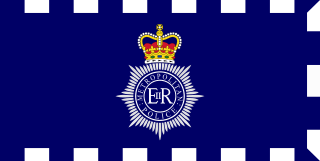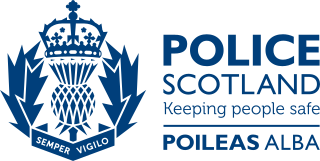The Specialist Crime Directorate (SCD) was one of the main branches of London's Metropolitan Police Service. It provided highly visible specialist policing services across the whole of London. Assistant Commissioner Mark Rowley had previously led the directorate but it was later led by Assistant Commissioner Cressida Dick. The Directorate led national police agency with regard to specialist crime investigations such as e-crime, sex crimes or kidnappings, hostage-taking and contract killings.

The Metropolitan Police Service (MPS) is the territorial police force responsible for law enforcement and the prevention of crime within the ceremonial county of Greater London. In addition, it is responsible for some specialised matters throughout the United Kingdom, including national counter-terrorism measures and the protection of specific people, such as the monarch and other members of the royal family, members of the government, and other officials.

The Police Service of Northern Ireland is the police force that serves Northern Ireland. It is the successor to the Royal Ulster Constabulary (RUC) after it was reformed and renamed in 2001 on the recommendation of the Patten Report.

Victoria Police is the primary law enforcement agency of the Australian state of Victoria. It was formed in 1853 and currently operates under the Victoria Police Act 2013.

South Australia Police (SAPOL) is the police force of the Australian state of South Australia. SAPOL is an independent statutory agency of the Government of South Australia directed by the Commissioner of Police, who reports to the Minister for Police. SAPOL provides general duties policing, highway patrol, criminal investigation and emergency coordination services throughout the state. SAPOL is also responsible for road safety advocacy and education, and maintains the South Australian Road Safety Centre.

The Specialist Firearms Command (SCO19) is the firearms unit of the Metropolitan Police Service. The Command is responsible for providing a firearms-response capability, assisting the rest of the service which is not routinely armed.

The Canadian Forces Military Police provide police, security and operational support services to the Canadian Armed Forces (CAF) and the Department of National Defence (DND) worldwide.

The Indonesian Army is the land branch of the Indonesian National Armed Forces. It has an estimated strength of 300,000 active personnel. The history of the Indonesian Army has its roots in 1945 when the Tentara Keamanan Rakyat (TKR) "People's Security Forces" first emerged as a paramilitary and police corps.
The Specialist Operations directorate is a unit of the Metropolitan Police of London, UK responsible for providing specialist policing capabilities including national security and counter-terrorism operations. The Specialist Operations Directorate is currently led by Assistant Commissioner Matt Jukes.
The Territorial Support Group (TSG) is a Met Operations unit of London's Metropolitan Police Service (MPS) which specialises in public order policing, amongst other specialist areas. In 2012 it consisted of 793 officers and 29 support staff. The TSG is a uniformed unit of the MPS that replaced the similarly constituted Special Patrol Group in 1987. TSG units patrol the streets of London in marked police vans or "carriers"; using the call sign prefix "Uniform". Generally each carrier has an advanced (police) driver, seven constables and a sergeant. Territorial Support Groups often comprise three carriers, twenty one constables, and three sergeants reporting to an Inspector. They separately patrol designated areas experiencing serious levels of gang violence or disorder. When deployed, it is by the MPS Information Room. Due to the public order nature of their role often numerous carriers will be assigned. TSG officers can be identified as TSG from the distinctive "U" in their shoulder numbers. Some TSG officers are also plainclothes officers, carrying a taser and handcuffs.

The Metropolitan Special Constabulary (MSC) is the volunteer police force of the Metropolitan Police Service. It is one of three Special Constabularies operating within London, the others being part of the City of London Police and British Transport Police. The service was created over 190 years ago under the Special Constables Act 1831. As of November 2021 it consists of 1,450 officers, making it the largest in the UK.
Territorial Operations was a group of eighteen specialist Metropolitan Police units which were set up in 1986 as part of Sir Kenneth Newman's restructuring of the Metropolitan Police Service. The Territorial Operations units were designed to support the Metropolitan Police areas—while area-based policing was designed to decentralise the operations of New Scotland Yard, the TO units were intended to provide central operational and logistic support to Areas and divisional OCUs.
Central Operations was a major directorate of the London Metropolitan Police Service that provides operational support to the rest of the service. It was commanded by Assistant Commissioner Mark Rowley, formerly Chief Constable of Surrey Police. In 2012 Central Operations (CO) merged with the Specialist Crime Directorate (SCD) to form Specialist Crime & Operations (SC&O)
Counter Terrorism Command (CTC) or SO15 is a Specialist Operations branch within London's Metropolitan Police Service. The Counter Terrorism Command was established as a result of the merging of the Anti-Terrorist Branch (SO13) and Special Branch (SO12) in October 2006, bringing together intelligence, operations, and investigative functions to form a single command. CTC has over 1,500 police officers and staff, and a number of investigators based overseas and also hosts the Counter Terrorism Policing headquarters.
A Police Support Unit or PSU is a unit of police officers who have undergone specialist tactical training in Public Order and Riot Control.

The Metropolitan Police of Greater London, England is organised into four main directorates, each with differing responsibilities. These are Frontline Policing, Met Operations, Specialist Operations, Professionalism and six civilian staffed support departments under the umbrella of Met Headquarters. Each is overseen by an Assistant Commissioner, or in the case of a support department a director of police staff which is the equivalent civilian grade.

The National Crime Agency (NCA) is a national law enforcement agency in the United Kingdom. It is the UK's lead agency against organised crime; human, weapon and drug trafficking; cybercrime; and economic crime that goes across regional and international borders; but it can be tasked to investigate any crime. The NCA has a strategic role as part of which it looks at serious crime in aggregate across the UK, especially analysing how organised criminals are operating and how they can be disrupted. To do this, it works closely with regional organised crime units (ROCUs), local police forces, and other government departments and agencies.

Police Scotland, officially the Police Service of Scotland, is the national police force of Scotland. It was formed in 2013, through the merging of eight regional police forces in Scotland, as well as the specialist services of the Scottish Police Services Authority, including the Scottish Crime and Drug Enforcement Agency. Although not formally absorbing it, the merger also resulted in the winding up of the Association of Chief Police Officers in Scotland.
Met Operations, also known as Met Ops, is one of the four business groups which forms the Metropolitan Police Service and is responsible for providing operational support services.. It was created during the 2018-19 restructuring of the service, amalgamating many of its functions from the Operations side of the Specialist Crime & Operations Directorate formed in 2012, with the Specialist Crime side of that Directorate placed under the new Frontline Policing Directorate. The group is currently led by Temporary Assistant Commissioner Matt Twist.
The Hong Kong Police Force (HKPF) is structured into numerous bureaus and units. As a whole, it is commanded by the Commissioner of Police, who is assisted by three deputy commissioners. The "Deputy Commissioner – Operations" supervises all operational matters including crime. The "Deputy Commissioner – Management" is responsible for the direction and co-ordination of force management including personnel, training, and management services. The “Deputy Commissioner — National Security” is responsible for the National Security Department, which deals with acts of sedition, terrorism, and collusion with foreign governments.











